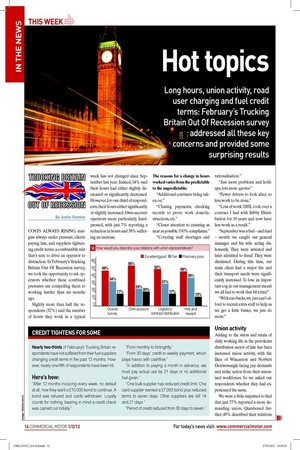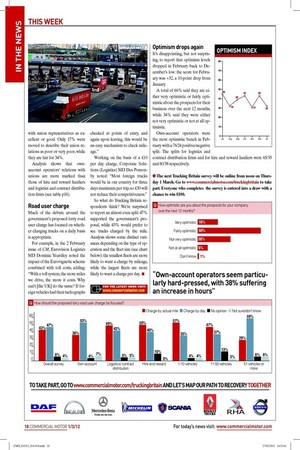Hot topics
Page 12

Page 13

If you've noticed an error in this article please click here to report it so we can fix it.
Long hours, union activity, road user charging and fuel credit terms: February’s Trucking Britain Out Of Recession survey addressed all these key concerns and provided some surprising results
By Justin Stanton
COSTS ALWAYS RISING, margins always under pressure, clients paying late, and suppliers tightening credit terms: a combustible mix that’s sure to drive an operator to distraction. In February’s Trucking Britain Out Of Recession survey, we took the opportunity to ask operators whether these combined pressures are compelling them to working harder than six months ago.
Slightly more than half the respondents (52%) said the number of hours they work in a typical week has not changed since September last year. Indeed, 14% said their hours had either slightly decreased or signiicantly decreased. However, for one-third of respondents, their hours either signiicantly or slightly increased. Own-account operators seem particularly hardpressed, with just 7% reporting a reduction in hours and 38% suffering an increase. The reasons for a change in hours worked varies from the predictable to the unpredictable: “Additional contracts being taken on.” “Chasing payments, checking records to prove work done/instructions, etc.” “Closer attention to ensuring as near as possible 100% compliance.” “Covering staff shortages and rationalisation.” “Just more problems and holdups, lots more quotes.” “Fewer drivers to look after, so less work to be done.” “Loss of work: DHL took over a contract I had with Bibby Distribution for 19 years and now have less work as a result.” “September was a bad – and mad – month: we caught our general manager and his wife acting dishonestly. They were arrested and later admitted to fraud. They were dismissed. During this time, our main client had a major ire and their transport needs were signiicantly increased. To lose an important cog in our management meant we all had to work that bit extra!” “With cut-backs, we just can’t afford to recruit extra staff to help as we get a little busier, we just do more.”
Union activity
Adding to the stress and strain of daily working life in the petroleum distribution sector of late has been increased union activity, with the likes of Wincanton and Norbert Dentressangle facing pay demands and strike action from their unionised workforces. So we asked our respondents whether they had experienced the same.
We were a little surprised to ind that just 27% reported a more demanding union. Questioned further, 49% described their relations with union representatives as excellent or good. Only 17% were moved to describe their union relations as poor or very poor, while they are fair for 34%.
Analysis shows that ownaccount operators’ relations with unions are more marked than those of hire and reward hauliers and logistics and contract distribution irms (see table p16).
Road user charge
Much of the debate around the government’s proposed lorry road user charge has focused on whether charging trucks on a daily basis is appropriate.
For example, in the 2 February issue of CM, Eurovision Logistics MD Dominic Yeardley noted the impact of the Eurovignette scheme combined with toll costs, adding: “With a toll system, the more miles we drive, the more it costs. Why can’t [the UK] do the same? If foreign vehicles had their tachographs
checked at points of entry, and again upon leaving, this would be an easy mechanism to check mileage.” Working on the basis of a £10 per day charge, Corporate Solutions (Logistics) MD Des Ponsonby noted: “Most foreign trucks would be in our country for three days maximum per trip, so £30 will not reduce their competitiveness.”
So what do Trucking Britain respondents think? We’re surprised to report an almost even split: 47% supported the government’s proposal, while 43% would prefer to see trucks charged by the mile. Analysis shows some distinct variances depending on the type of operation and the leet size (see chart below): the smallest leets are more likely to want a charge by mileage, while the largest leets are more likely to want a charge per day. ■
Optimism drops again
It’s disappointing, but not surprising, to report that optimism levels dropped in February back to December’s low: the score for February was +32, a 10-point drop from January.
A total of 66% said they are either very optimistic or fairly optimistic about the prospects for their business over the next 12 months, while 34% said they were either not very optimistic or not at all optimistic.
Own-account operators were the most optimistic bunch in February with a 76/24 positive/negative split. The splits for logistics and contract distribution irms and for hire and reward hauliers were 65/35 and 60/38 respectively.
Jul Aug Sep Oct Nov Dec Jan
● The next Trucking Britain survey will be online from noon on Thursday 1 March. Go to www.commercialmotor.com/truckingbritain to take part. Everyone who completes the survey is entered into a draw with a chance to win £100.
CREDIT TIGHTENS FOR SOME
Nearly two-thirds of February’s Trucking Britain respondents have not suffered from their fuel suppliers changing credit terms in the past 12 months. However, nearly one-fifth of respondents have been hit.
Here’s how:
“After 12 months invoicing every week, no default at all, now they want a £10,000 bond to continue. A bond was refused and cards withdrawn. Loyalty counts for nothing, bearing in mind a credit check was carried out initially.” “From monthly to fortnightly.” “From 30 days’ credit to weekly payment, which plays havoc with cashflow.” “In addition to paying a month in advance, we must pay actual use by 21 days or no additional fuel given.” “One bulk supplier has reduced credit limit. One card supplier wanted a £7,000 bond plus reduced terms to seven days. Other suppliers are still 14 and 21 days.” “Period of credit reduced from 30 days to seven.”












































